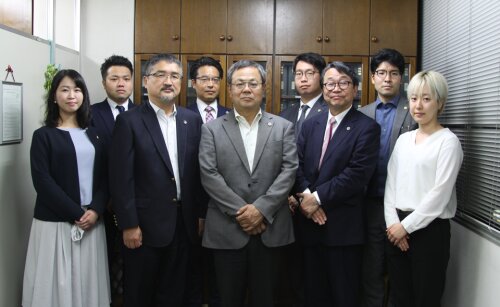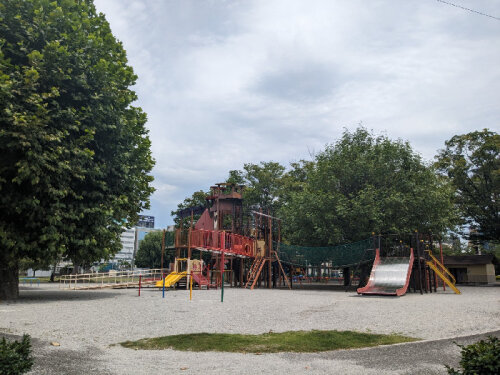Best Lawyers in Shizuoka
Share your needs with us, get contacted by law firms.
Free. Takes 2 min.
List of the best lawyers in Shizuoka, Japan
About hiring a lawyer in Shizuoka, Japan
Hiring a lawyer in Shizuoka follows a straightforward process. Lawyers in Japan are licensed lawyers called bengoshi and are regulated by local bar associations. The typical steps are - identify the legal issue, contact law firms or use an official referral or legal-support service, schedule an initial consultation, agree on fees and a written engagement letter, and then proceed to advice, negotiation, mediation, or court representation as needed. Many law firms offer a first consultation - sometimes free or at a reduced fee - so you can explain your situation and get a basic assessment before committing.
Language is an important practical consideration. Most lawyers work primarily in Japanese. If you are a non-Japanese speaker, look for lawyers who advertise foreign-language support or arrange for an interpreter. If the matter is urgent - for example, arrest or criminal investigation - contact a lawyer immediately because quick legal assistance can affect outcomes.
Why You May Need a Lawyer
Family matters - divorce, child custody, visitation rights, spousal support, inheritance disputes, and drafting wills often require lawyer assistance to protect rights and prepare legally binding documents.
Criminal matters - if you are arrested, questioned by police, or charged with a crime, you will need an experienced criminal lawyer for immediate representation and advice on detention, bail, and court defense.
Traffic and accident claims - traffic accidents commonly involve injury claims, compensation negotiations, and insurance disputes where a lawyer can help calculate damages and negotiate with insurers.
Employment issues - wrongful dismissal, unpaid wages, workplace harassment, and employment contract disputes commonly require legal advice to follow appropriate labor procedures and, where needed, file claims with labor tribunals or courts.
Consumer disputes - problems with services, purchases, contractor work, or defective products may lead to consumer claims where a lawyer can help pursue refunds, repairs, or compensation.
Real estate and landlord-tenant issues - disputes over rental agreements, eviction, property boundary problems, zoning, and development approvals often require legal review and representation.
Business and commercial law - starting a local business, drafting contracts, resolving commercial disputes, and handling regulatory compliance require lawyers experienced in corporate and commercial law.
Immigration and administrative procedures - visa issues, deportation risks, and appeals against administrative decisions are areas where lawyers can provide representation and prepare required documents.
Disaster-related claims - Shizuoka is prone to earthquakes and other natural disasters. Claims against insurers, government compensation matters, and reconstruction disputes can benefit from legal guidance.
Local Laws Overview
In Japan, national laws apply throughout Shizuoka, but the prefecture and municipalities also adopt local ordinances that affect daily life and business. Key areas relevant to people seeking legal help include civil law - covering contracts, obligations, property, and family matters; criminal law - covering offenses and the criminal procedure system; labor law - regulating contracts, working conditions, and dispute resolution; administrative law - governing interactions with government agencies, permits, and appeals; and consumer protection law.
Property and real estate matters are governed by the Civil Code, registration laws, and local land-use and building regulations. Before buying or developing land in Shizuoka, check local zoning rules and prefectural ordinances that may restrict use in certain areas - particularly near coasts or seismic zones.
Family law and inheritance cases follow statutory rules under the Civil Code, including legal formalities for wills and inheritance division. Timeliness matters - there are statutory limitation periods for many civil claims, so early legal advice helps protect your rights.
Employment disputes are guided by the Labor Standards Act and related regulations. Many disputes are first handled through labor bureaus or mediation before court. Consumer protection and product liability are increasingly important - national consumer law and the Consumer Contracts Act provide remedies for unfair business practices and defective products.
For dispute resolution, Japan offers several forums - summary courts for smaller civil claims, district courts for more substantial cases, family courts for family and juvenile matters, and specialized administrative procedures for challenges to government decisions. Mediation and settlement - both court-affiliated and private - are commonly used and often encouraged as quicker, less costly alternatives to full litigation.
Frequently Asked Questions
How do I find a lawyer in Shizuoka?
You can search for local law firms, ask for referrals from friends or business contacts, or use official legal-support services such as the Japan Legal Support Center - Houterasu. Also consider contacting the local bar association or law-firm websites to check practice areas. For specialized matters - criminal, family, immigration, or corporate - look for a lawyer with proven experience in that field.
How much will a lawyer cost in Shizuoka?
Fees vary by firm, complexity, and case type. Typical fee components include an initial consultation fee, a retainer or advance payment, hourly fees or fixed fees for specific tasks, and possibly success fees for certain civil matters. Always ask for a written fee agreement or engagement letter that explains the billing method, what services are included, and any additional costs such as court fees and expert expenses.
Are contingency or success-fee arrangements allowed in Japan?
Success-fee arrangements are permitted under regulated conditions. Contingency-fee practices vary by case type and must comply with professional rules. Discuss fee structure and any success-fee elements with the lawyer before you sign an engagement letter so you clearly understand how fees will be charged.
Can a lawyer represent me if I do not speak Japanese?
Some lawyers in Shizuoka offer English or other foreign-language services, but many work primarily in Japanese. If you need language support, ask the firm about foreign-language lawyers, interpreters, or whether they will allow you to bring a trusted interpreter. For urgent or criminal matters, obtain help quickly and arrange interpretation if necessary.
What should I bring to my first consultation?
Bring any documents related to your case - contracts, correspondence, police reports, medical records, court or administrative notices, identification, and a written timeline of events. A clear summary of what you want to achieve and a list of questions for the lawyer will make the consultation more productive.
How long will my case take?
Duration depends on the type of matter. Negotiations or mediation can take weeks to months. Civil litigation and trials can take many months to years, depending on complexity and appeals. Criminal cases also vary - immediate matters like bail hearings move quickly, but trials and appeals take longer. Your lawyer should provide a realistic timeline based on the specifics of your case.
What is legal aid and can I get it?
Legal aid programs are available for people who cannot afford private legal services. The Japan Legal Support Center - Houterasu provides information on legal aid, consultation services, and possible fee assistance for qualifying persons. Eligibility depends on income, assets, and the nature of the legal matter.
Can a lawyer represent me if I am arrested or detained?
Yes. If you are arrested or detained, you have the right to consult a lawyer. It is important to contact a lawyer immediately. A criminal lawyer can attend police questioning, advise you on your rights, and help secure bail. If you are a foreign national, inform your consular office after contacting a lawyer if you wish to do so.
How do I change or dismiss my lawyer if I am not satisfied?
You may change lawyers if you are not satisfied, but consider discussing concerns with your current lawyer first. Check the engagement letter for any written terms on termination. A new lawyer can often take over but may need time to review the file and may charge for the transition. Ensure you get copies of your file and written confirmation of the change.
What privacy and confidentiality protections apply?
Lawyer-client communications are generally confidential under professional rules, and lawyers are required to protect client information. There are limited exceptions - for example, where disclosure is required by law. Confirm confidentiality expectations with your lawyer during the initial meeting and in the engagement letter.
Additional Resources
Japan Legal Support Center - Houterasu - offers consultations, legal-aid information, and referral services for individuals across Japan. Visit the official site for contact details:
Ministry of Justice - provides information on the legal system, rights, and regulations in Japan:
Consumer Affairs Agency - useful for consumer protection issues and guidance on complaints:
Shizuoka Prefectural Government - for local administrative matters, permits, disaster information, and local services:
Local bar association - the Shizuoka bar association and local law firms can help you locate lawyers with relevant expertise. While bar associations are not government agencies, they are an important professional resource in Shizuoka.
Your embassy or consulate - if you are a foreign national, your embassy or consulate can provide consular assistance and guidance about local legal and translation resources.
Next Steps
1. Identify the core legal issue and your desired outcome. Write a short timeline of events and list key documents you have.
2. Seek an initial consultation. Use Houterasu or local referrals to find a lawyer with the right experience. Ask if they offer consultations in your language or if an interpreter is available.
3. Prepare questions for the consultation - ask about likely steps, estimated timeline, fee structure, success-fee possibilities, and any alternatives such as mediation.
4. Check credentials and read the engagement letter carefully before signing. Confirm who will handle the matter, expected costs, and billing procedures.
5. Keep organized records and copies of all documents, correspondence, and receipts. Maintain regular communication with your lawyer and ask for written updates on key developments.
6. If cost is a barrier, ask about legal-aid options and low-cost consultation services provided by official bodies. Consider mediation or settlement if appropriate to save time and expense.
7. For emergencies - criminal arrests, immediate danger, or urgent administrative deadlines - act quickly. Contact a lawyer without delay and, if needed, notify your embassy or local authorities.
Taking these steps will help you find reliable legal assistance in Shizuoka and move your matter forward with greater clarity and confidence.
Lawzana helps you find the best lawyers and law firms in Shizuoka through a curated and pre-screened list of qualified legal professionals. Our platform offers rankings and detailed profiles of attorneys and law firms, allowing you to compare based on practice areas, experience, and client feedback.
Each profile includes a description of the firm's areas of practice, client reviews, team members and partners, year of establishment, spoken languages, office locations, contact information, social media presence, and any published articles or resources. Most firms on our platform speak English and are experienced in both local and international legal matters.
Get a quote from top-rated law firms in Shizuoka, Japan — quickly, securely, and without unnecessary hassle.
Disclaimer:
The information provided on this page is for general informational purposes only and does not constitute legal advice. While we strive to ensure the accuracy and relevance of the content, legal information may change over time, and interpretations of the law can vary. You should always consult with a qualified legal professional for advice specific to your situation.
We disclaim all liability for actions taken or not taken based on the content of this page. If you believe any information is incorrect or outdated, please contact us, and we will review and update it where appropriate.
Refine your search by selecting a practice area.






























